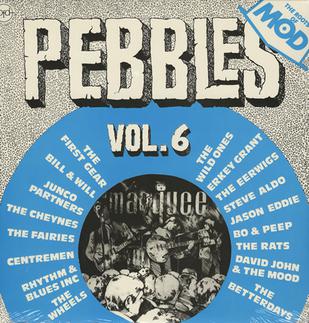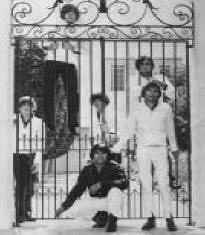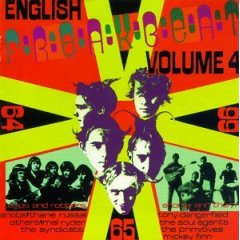Freakbeat is a loosely defined subgenre of rock and roll music developed mainly by harder-driving British groups during the Swinging London period of the mid-to late 1960s. The genre bridges British Invasion R&B, beat and psychedelia.
The Choir was a garage rock band largely active in the greater Cleveland area from the mid-1960s into the early 1970s. Originally called The Mods, their largest commercial success came with the release of their first single "It's Cold Outside" in December 1966. The song, considered to be a classic of the garage rock era, was featured on Pebbles, Volume 2, one of the earlier garage rock compilation LPs. The flipside, "I'm Going Home" was included as a bonus track when the Pebbles album was reissued as a CD, and it can also be found on a garage rock compilation LP on Ohio bands, Highs in the Mid-Sixties, Volume 9. The Choir is well known for containing three of the four original members of Raspberries.
Milan Radenkovich (December 15, 1941 – March 14, 1971), who was always credited mononymously as Milan, was an American record producer, songwriter and recording artist on numerous songs made throughout the 1960s, mostly though not exclusively in the garage rock genre. He released an LP and numerous singles for seven different national record labels and other independent labels (a total of more than 30 songs) under a variety of names, including Milan with His Orchestra, Milan, The World of Milan, Milan (The Leather Boy), and The Leather Boy, and also worked under the name Rick Rodell. As a producer, arranger and/or songwriter, Milan oversaw many other releases by a variety of artists ranging from the pop singer Lou Christie to the psychedelic rock band the Head Shop.

AIP Records is a record label that was started by Greg Shaw's Bomp! Records in 1983 to continue the Pebbles series. AIP stands for "Archive International Productions". The first 10 volumes in the Pebbles series had been released by BFD Records of Kookaburra, Australia in 1979–1980 and have been kept in print by AIP for many years. Including those in the companion Highs in the Mid-Sixties series – which concentrated on American regional music scenes – there are over 50 LPs covering some 800 obscure, mostly American "Original Punk Rock" songs recorded in the mid-1960s – primarily known today as the garage rock and psychedelic rock genres – that were previously known only to a handful of collectors.

Pebbles is an extensive series of compilation albums in both LP and CD formats that have been issued on several record labels, though mostly by AIP. Together with the companion Highs in the Mid-Sixties series, the Pebbles series made available over 800 obscure, mostly American "Original Punk Rock" songs recorded in the mid-1960s — primarily known today as the garage rock and psychedelic rock genres — that were previously known only to a handful of collectors. In 2007, the release of the Pebbles, Volume 11: Northern California CD marked the final album in the Pebbles series. The following year, Bomp! marked the 30th anniversary of the original Pebbles album with a spartan, limited-edition, clear-vinyl reissue complete with the original pink cover insert.

Pebbles is a compilation of US underground and garage single record releases from the mid- to late-1960s. It had a limited original release in 1978 and a more general release in 1979. It was followed by several subsequent Pebbles compilations and albums. This album is nowadays known as Pebbles, Volume 1 and was originally issued in 1978 as Pebbles, Volume One: Artyfacts from the First Punk Era, an obvious riff on Nuggets: Original Artyfacts from the First Psychedelic Era, a similar, groundbreaking compilation from 1972.

Pebbles, Volume 6 is a compilation album among the LPs in the Pebbles series. Subtitled The Roots of Mod, Volume 6 is the only album in the Pebbles series that features primarily British music. The Pebbles, Volume 6 CD is not at all related to this LP; instead, the CD featuring the songs on this LP was released as English Freakbeat, Volume 6.
Rubble is a 20-volume collection of compilation albums featuring mostly late-1960s British psychedelic rock compiled by Bam-Caruso Records, St Albans, Herts, England by Phil Lloyd-Smee.
Mouse and the Traps is the name of an American garage rock band from Tyler, Texas, United States, that released numerous singles between 1965 and 1969, two of which, "A Public Execution" and "Sometimes You Just Can't Win", became large regional hits. The leader of the band, nicknamed "Mouse", was Ronny Weiss. Two of their best known songs, "A Public Execution" and a cover of "Psychotic Reaction", are not actually credited to this band but, respectively, to simply Mouse and Positively 13 O'Clock instead. Their tangled history also included one single that was released anonymously under the name Chris St. John. The band are not to be confused with the girl group Mousie and The Traps who recorded for Toddlin' Town records around the same time.

The Highs in the Mid-Sixties series is a group of 23 compilation albums of garage rock and psychedelic rock recordings that were issued by AIP Records in the mid-1980s. This series is a companion to the Pebbles series of similar music; the title is technically preceded by "Pebbles Presents:". The title sounds like it might have come from a weather report, although "Highs" intends to mean "the best", while the recordings on these albums were originally released in the mid-1960s.

Ear-Piercing Punk is a compilation album issued in both LP and CD formats of obscure 1960s garage rock that was originally released on AIP Records in the late 1970s. As discussed on the AIP Records website and in reviews of the album during its initial release, the album was given the name "Ear-Piercing Punk" to try to market or turn this music, now often referred to as proto punk, on to kids just getting into punk rock for the first time as a result of the 1970s punk explosion. The purpose of the album was to show that punk had existed for quite a number of years prior to the generally accepted mainstream use of the term to define bands such as the Ramones, Sex Pistols and The Clash.

The Essential Pebbles Collection is a series of compilation albums of obscure garage rock and psychedelic rock recordings that were originally released in the mid-1960s. As the name implies, the series was created by AIP Records as a distillation of the albums in the Pebbles series and the Highs in the Mid-Sixties series that had been released in earlier years. Only two more albums in the Pebbles series have been issued since the Essential Pebbles series was begun.

The Human Expression was an American garage and psychedelic rock band from Los Angeles that released three well-regarded singles, and made additional demo recordings between 1966 and 1967.
Highs in the Mid-Sixties were a series of compilation albums released in the mid 1980s on AIP Records developed by Greg Shaw. The series was spun off of the similar Pebbles series. Each volume focuses on a specific geographical region.

English Freakbeat, Volume 1 is a compilation album in the English Freakbeat series, featuring recordings that were released decades earlier, in the mid-1960s.

English Freakbeat, Volume 2 is a compilation album in the English Freakbeat series, featuring recordings that were released decades earlier, in the mid-1960s.

English Freakbeat, Volume 4 is a compilation album in the English Freakbeat series, featuring recordings that were released decades earlier, in the mid-1960s.

English Freakbeat, Volume 5 is a compilation album in the English Freakbeat series, featuring recordings that were released decades earlier, in the mid-1960s.
Back from the Grave is a series compilation albums of 1960s garage rock created and compiled by Tim Warren and released by Crypt Records. The series originally consisted of eight LP records released between 1983 and 1992. Volumes seven and eight were double albums. Starting in 1994, the series was reissued on compact disc. Due to the longer playing times offered by CDs, the first seven volumes were contained on four discs, save for a few tracks that were omitted. And, while all of the songs on the first four CDs are included on first seven vinyl albums, they do not necessarily correspond to the individual LPs bearing their same titles. However, the Volume 8 CD corresponds almost directly its LP double-LP counterpart, but with the addition of four bonus tracks not included on the LP. The eight vinyl albums are titled consecutively "Back from the Grave, Volume 1, Volume 2, Volume 3, Volume 4, Volume 5, Volume 6, Volume 7, Volume 8, Volume 9, and Voume 10". In similar fashion the five CDs are titled "Back from the Grave, Volume 1, Volume 2, Volume 3, Volume 4, Volume 8, and Volumes 9 & 10". There are no volumes 5, 6, or 7 for the CDs. Two separate LPs for Volume 9 and 10 were released in 2015 as well one CD, released the same year, which combines Volumes 9 and 10 onto one double-length disc.












